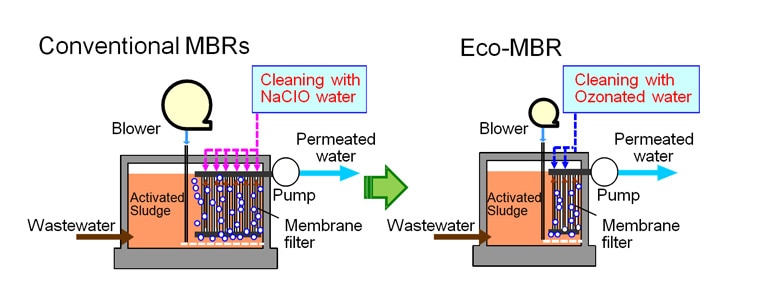FOR IMMEDIATE RELEASE No. 3033
Mitsubishi Electric to Field Test Ozone Backwashing Energy-Saving Membrane Bioreactor in Singapore
Expected to contribute to global water sustainability
TOKYO, July 11, 2016 - Mitsubishi Electric Corporation (TOKYO: 6503) announced today that it will conduct a field test of its Ozone Backwashing Energy-Saving Membrane Bioreactor (Eco-MBR) for the recycling of sewage and industrial wastewater with low energy consumption at the Public Utilities Board's (PUB), Singapore's national water agency, Changi Water Reclamation Plant (CWRP). The field test is expected to verify that the Eco-MBR, when compared to conventional MBRs, both potentially reduces energy consumption and dramatically increases the quantity of permeated water per membrane filter surface area (flux), thanks to a filter-cleaning process using ozonated water. Mitsubishi Electric is now developing practical applications for sewage, industrial water treatment and recycling systems, which are expected to contribute to global efforts to achieve sustainable water environments.

Eco-MBR field test site at Changi Water Reclamation Plant, Singapore
Building on the technological expertise of more than 1700 delivered ozone generators, Mitsubishi Electric has been developing its high-performance Eco-MBR as a solution for areas around the world that are experiencing increased demand for water. Due to limited water resources in Singapore, the government and industry are successfully applying water-reuse solutions to provide alternative, sustainable supplies of water, especially for industrial use. Currently, Singapore's supply of potable recycled water (known as NEWater) is sufficient to meet 30 percent of the nation's water needs. The pilot-scale study will be carried out in cooperation with the PUB and the Centre for Water Research at the National University Singapore until December 2016. Commercialization of the Eco-MBR is scheduled by the year 2018.
Tests so far have shown that the Eco-MBR is able to achieve a high-quantity flux, or quantity of permeated water per membrane surface area, that is more than twice the rate of conventional MBRs*. The key is regularly backwashing the membranes with highly concentrated ozonated water to remove virtually all organic foulants, thereby increasing membrane permeability. In addition, the Eco-MBR lowers energy consumption by using a reduced flow rate for air bubbles that are emitted from a blower to clean the membrane surfaces. The Eco-MBR also enables the use of fewer membranes, resulting in smaller plant and system footprints.
Going forward, Mitsubishi Electric will continue working toward commercial use of its Eco-MBR in municipal and industrial water-reuse systems, aiming to contribute to water sustainability worldwide.
*According to Mitsubishi Electric research as of July 11, 2016

Note that the releases are accurate at the time of publication but may be subject to change without notice.
